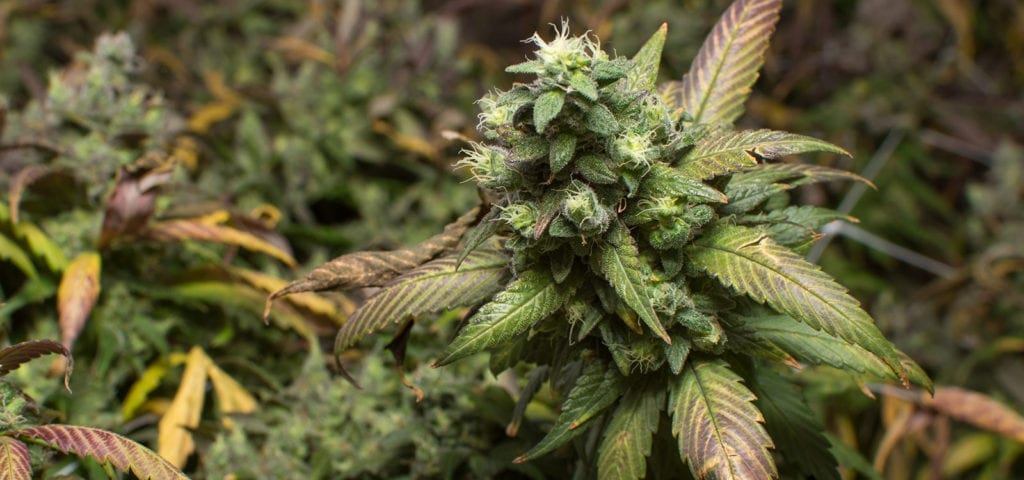Hadley Ford is the co-founder and CEO of iAnthus Capital Holdings, a cannabis finance and investment firm with active partnerships in four different legal U.S. markets.
In the following interview, our podcast host TG Branfalt interviews Hadley about his life before entering the world of finance, which included five years spent in communes and hitchhiking around Europe and the United States. The two also discuss cannabis companies trading on the Canadian stock market, the many investment opportunities found in cannabis, strategies for choosing the right state market for an investment, and much more!
Listen to the interview below, or keep scrolling to read a full transcript of this podcast.
Subscribe to the Ganjapreneur podcast on iTunes, Stitcher, SoundCloud or Google Play.
Listen to the podcast:
Read the transcript:
TG Branfalt: Hey there, I’m TG Branfalt and you are listening to the Ganjapreneur.com podcast. The Ganjapreneur.com podcast gives us an opportunity to speak directly with entrepreneurs and experts who are working on the front lines of the industry to normalize cannabis through responsible business, education and activism. As your host, I will do my best to try to bring you actionable information to help you plan, grow and manage your cannabis business.
Today, I’m joined by Hadley Ford, co-founder and CEO of iAnthus Capital Holdings. How are you doing today, Mr. Ford?
Hadley Ford: Very well, TG. Thanks for having me on.
TG Branfalt: Absolutely. It’s a pleasure. I start these interviews with talking about the background of my guests. But, through my research I found an article that talks about your experience in Europe. So, before we get into your background, why don’t you tell us about what you did in Europe.
Hadley Ford: About my checkered past, “Come the revolution.” I was an aspiring chemical engineer at the University of Rochester and was thrown out of that school. That’s a story for another time with a beer in front of us or something else to consume. I then spent the next five years hitchhiking around Europe and the United States living in communes with hair halfway down my back and “Come the revolution” and all that good stuff. I had to find a way to support myself so I was a street performer as a juggler and did some big form magic, as well, pulling ropes through people and things like that. Just sort of lived outside the grid for five-ish years.
TG Branfalt: So, now you’re applying a sort of magic to a whole new industry.
Hadley Ford: (Laughs) And a lot of juggling, a lot of juggling as well.
TG Branfalt: Of course, of course. So, now can you tell us how you ended up getting into the financial and healthcare industry?
Hadley Ford: It’s the usual path of anyone who’s going to go work on Wall Street that you have to be a long-haired anarchist living in communes. It was quite a turnaround. I had thought that was the path I was going to be on for the rest of my life, but life had different aspirations for me. Sort of one turn at a time occurred and I found myself back in the United States and I found myself taking night classes up in Boston, at Boston University. And I stumbled into some accounting classes, and I liked that and the next thing you know I was a Finance major at Boston University. After that I became a research analyst at Fidelity. And I went back to business school at Stanford and was recruited out at First Boston, got recruited away to join Goldman, then worked at Goldman really on both the principal side for awhile and also the corporate finance and M&A side, mostly in media and telcomm.
And then I left that and did a little content delivery start-up and competed against Akamai. Sold that company and then re-joined Bank of America as head of the tech group out of New York. And, did that for about three years. I got a phone call from an old client of mine at Goldman; he claimed his father had found a way to cure cancer, and would I sit down with him and figure out how he could finance that? So I sat down and I was so enamored of both of his father and the business plan, that I quit my job at Bank of America and the plushly appointed offices there, and waded into start up a company called Procure Treatment Centers which ultimately became the largest provider of proton therapy in the world. We raised about $800 million privately and saved thousands of lives.
Unfortunately, we depended very heavily on debt capital for the growth of that company. The debt crisis hit; we didn’t have access to growth capital. We ran it as an operating company for three or four years. And then I wanted to do something that was more growth-oriented. So, had an amicable separation and went off to see what the next big opportunity could be.
Around that time, I got a phone call from a guy I’d done a lot of business with when I was at Goldman. Actually, had invested in his company and taken him public, sat on his board. He called me out of the blue and said “What are you doing?” I said I’m looking for the next big thing. He said “I found the next big thing.” I said “What’s that?” And when I’d dealt with him before, he had been emerging telcomm, he’d done some internet stuff, he’d done some virtual currency companies. So I was expecting 1s and 0s.
Instead, he says “Cannabis.” And I laughed. And he said “Why are you laughing, it’s a $50 billion industry we went from black to white.” And I said “I’m laughing because my brother is already the largest provider of medical cannabis in New Mexico and my sister’s one of four licensed operators in Vermont. It’s kind of the family business. And he said “Well, you’re an entrepreneur. Why aren’t you in the family business?” And I said “Well, I’m not really convinced that there’s a national opportunity right now. It’s a very good business on a local basis. You get a license and you finance it with your friends and family and you’ve got a good business. You join the country club and it’s very respectable. But how do you scale that? You can’t ship product across state lines. You can’t even get a trademark or a copyright on your name. I don’t know how you scale it nationally.”
So, this fellow, Randy, who is now my partner, said “Well, we always liked working with each other. Why don’t we figure something out?” So we traveled around the country. Went to conferences. Met with operators. And determined two things, which we may have been able to determine in an afternoon with a six pack. But, the first is that there’s no regular way institutional capital available to the cannabis entrepreneur in the United States. So, if you are fortunate enough to have a license, you had no access to institutional capital for starting your business, growing your business, buying out your partner, or, if you wanted to sell your business, be acquired and have acquisition finance, either.
The second piece is because you don’t have access to institutional capital, you didn’t see all the usual camp followers you’d see in a growth industry. You didn’t have, you know, a lot of accountants, lawyers, consultants, advisors who are there. So, you had this weird anomaly where the entrepreneur has a license but has none of the usual factors of company-building available to him or her.
We thought, “That’s sounds pretty easy.” We’ll just set up a little merchant bank. We’ll raise $200 or $300 million. Charge two and twenty. And, we’ve both built big companies. We’ll go in and help people build companies and provide financing for it. But, for the same reason that Citibank wasn’t going to write a prime plus two loan for someone’s greenhouse, you weren’t going to get CalPERS or Toronto Teachers to give you a $30 million blank check into a $300 million fund. So, we kind of scratched our head about the supply side of the equation for awhile and then we discovered the Canadian public markets, which are really the only capital markets in the world, public or private, that has shown a willingness to provide financing for cannabis operators.
Now, there happened to be Canadian operators and there happened to be Canadian investors, but our supposition was that we could structure something, raise money publicly in Canada, educate the investor there about the opportunities in the U.S., and then flow that money in to support the U.S. cannabis entrepreneurs. That’s sort of the CV that gets me from juggling in Europe and living in communes all the way to providing institutional capital for entrepreneurs in the cannabis space today.
TG Branfalt: So, let’s get right into some of the financials here. What is the importance of harnessing the right skills to support a diversified portfolio of cannabis industry investments for shareholders?
Hadley Ford: Well, I think, you know, if you’re an investor … A sort of public market security investor and you say “Gee, I see this tremendous growth opportunity where, you know it’s really unprecedented where you’ve got a $50 billion market that’s … Think of that reservoir of cash and someone opens up this sluice gate and all that cash is flowing from illegal owners to entrepreneurs who’ve been licensed with background checks, it’s sort of a built-in 30% growth for the next 10 years.
But, there’s no real way for the public investor to sort of access that growth opportunity. So, you’ve got to say “What public companies are there that I can invest in?” Well, you can invest in the Canadian guys, but they don’t have any real exposure to the U.S. market. And then you look at the U.S. public stocks and you’ve probably got 250 companies that used to be Joe’s Mining Company that renamed themselves Joe’s Cannabis Company. And, then you’ve got sort of a handful of companies that are, you know, what I would call operating companies with management teams and operations that are kind of small cap. What you want to make sure from an investment perspective is that those management teams actually have the appropriate backgrounds and excellence and skill sets that you can trust them to actually go execute and make a dollar for you from an investment perspective.
So, what we offer the retailer/institutional investor, from a public security perspective, is a team that has actually worked within the world of finance and corporate governance and regulation and real estate. And, I think people can take great confidence that, when we diligence something or structure something, that it’s being done in the same form or fashion that they would expect someone from Sand Hill Road or Wall Street to do.
So, from an investment perspective, you know I think it provides security that the cash you’re putting to work is going to be put to work in a prudent and effective manner. So, it’s really, you just want to see all those skill sets, if someone’s actually going to be investing money in cannabis, you want to make sure they have the background of diligence and modeling and legal and regulatory and documents and all that sort of good stuff.
Because our view is cannabis expertise are kind of the table stakes, right? You’ve got a vast network of people who help us diligence the cannabis piece of it. But, then the value-add piece becomes “How do you deal with regulation, real estate, making sure you have enough money to build your model out, things like that?” And, that’s the expertise we bring to the table.
TG Branfalt: How much in the early going did you rely on your family to help you navigate this industry?
Hadley Ford: 100%. I mean, it’s a brand new industry. You just really have to have someone you can trust who can educate you on the ins and outs and quirks that are kind of the daily stuff you face in the cannabis industry. So, the idea that I actually had family members that were in the business and they could help get me up to curve on things you have to be aware of and think about was invaluable. And that also allowed us to have that as a launching pad from an investment perspective to raise the initial capital. Because, it’s nice to have a good idea, but it’s a lot better if you actually have some investments that you’re already making.
So, you know, I would say that, without their involvement, there wouldn’t be an iAnthus. It was a nice intersection point or Venn Diagram, as it were, where I had two siblings who were cannabis experts and they had a sibling who was a financial expert. And that’s a nice combination. It’s a confluence of events that was very fortunate for both them and for me.
TG Branfalt: So, moving to kind of a bigger picture, what’s your take on the experience of innovative industrial properties. There’s that real estate investment trust that was focused on cannabis industry properties, you know they were approved for a listing on the New York Stock Exchange in November. They had to reduce that IPO goal from $175 million to $100 million; they cut their number of shares offered by more than half, from 8.75 to 4 million. Why do you think that this failed to gain the traction that it anticipated on this major market?
Hadley Ford: You know, I’d say a couple of things. I’d say one of the big positive … And I was surprised, right, that the New York Stock Exchange approved it for listing. I mean, that is a great vote of confidence for the future of cannabis and the capital markets because, you’re probably aware that NASDAQ has repeatedly denied listing applications to their exchange.
And, ultimately, the Canadian market is a fine place to raise capital now, but the U.S. market is going to be vast and large and need a lot more capital than probably Canadian markets can provide over time. So, you do need to have a working capital market, public market, down here in the U.S. to effectively support the growth of the industry.
So, I think that is a great positive takeaway. Now, technically, why would they go from 175 to 100? Well the people who are involved in innovative industrial had had great success in the past in other industries. In healthcare REITs and things like that. And, I think, probably their anticipation was that you’d have much more institutional participation in a deal. Now, I didn’t see the book and how it was allocated, but my guess would be they had zero institutional interest. Very hard to do an all retail deal of $175 million. Matter of fact, I was talking to people about the deal before it actually went out in the market or before they tried to price it. And I think everyone was of the same view that, from just a pure retail allocation, they were going to be well south of $100 million or being able to get capital out of the market.
So, it wasn’t a surprise to me or really any of the bankers who were watching the deal that it didn’t raise the type of capital it wanted to originally. But, I think, what it did do, was set precedent that there’s an actual cannabis business model listed on the New York Stock Exchange and it’ll be up to them to execute. And, if they execute, I think they’ll be able to raise more retail money. And my expectation would be that, sometime in the next year or two, you’ll start to see institutions play as well, as they become more comfortable with the concept of cannabis within the public markets in the U.S.
TG Branfalt: Do you feel that this political climate is safe to invest in? We’ve got Jeff Sessions who has been an outspoken opponent of legalization, and there’s really been no movement on a federal level for a comprehensive medical program or any sort of major reforms. So, what is your feeling about this political climate in terms of investments?
Hadley Ford: Well, I’m kind of torn. Because, as a provider of capital, I like people to think it’s a wild and dangerous place so it keeps out other providers of capital. But, rather than play the game theory and say yes, it’s very dangerous, don’t come into it, I’ll give you the straight up thought of how I think about it. Because I get this question all the time.
I don’t lose any sleep over it. Let’s call a spade a spade here. I mean, it’s against the law at the federal level. If you go back and look at what Loretta Lynch or Eric Holder said about cannabis in their confirmation, actually worse than what Sessions said. At least Sessions showed some … You know sort of said “OK, there’s the Cole memo and I have to undertake my sworn duty to enforce the laws of the United States.” But it’s a matter of resources and the Cole memo is informative. Go back and look at what Loretta Lynch said. She said “It’s against the law and where we see cannabis, we see violence.” It would make your feet go cold. Frankly, the Obama administration weren’t great friends to cannabis. Eight years, I didn’t see anything get rescheduled or descheduled or decriminalized.
The Cole memo came out, and that was nice. But there was no, as you point out, proactive movement in that direction. And, frankly, I think if you go back and look at what the industry thought about the Obama administration’s view on cannabis, I think there was great disappointment that there wasn’t a more proactive stance. I don’t have any expectation that the Trump administration is going to be proactive, but I don’t have any fear that they’re going to send the Feds in to shut stuff down. I just think it’s way down the list of things that are important to the administration and I do think that many within the transition team and many of the appointees are states rights and that’s the way it’s going to go. I expect, for the next four years, you’re going to have this uneasy peace between the Federal government and the states, but that’s going to be business as usual.
There has been sort of a little pause, from at least my understanding … We’re not in the business of raising private capital, but a lot of the guys we’re talking with are, and they sort of give us feedback that there’s been a little bit of pause in the ability to raise private capital. But I don’t think anyone thinks you’re going to see a proactive roll-back of anything at this juncture.
TG Branfalt: So, I want to talk to you a bit about the Canadian government that is being proactive. But before we get to that, we’ve got to take a short break. This is the ganjapreneur.com podcast. I’m TG Branfalt.
This episode of the ganjapreneur.com podcast is made possible by Name.com, a global provider of domain name, web hosting, and email services. Every successful cannabis business needs an online presence. And, every successful online presence begins with a domain. From your website to your email address, a good domain is easy for your customers to remember, it looks nice on a business card or billboard and it reflects the true identity of the project it represents.
It’s important to reserve your domain early on when you are starting your business as you may find that the .com address for your preferred brand or concept has already been taken. If somebody has already purchased the ideal .com for your business, they might be willing to sell it. But, if they aren’t, you may have to get creative with one of the new alternate domain extensions, such as .co, .club, .shop, or even, .farm. Reserve your domain name today at Name.com/ganjapreneur.
If you are a domain name investor or venture capital firm interested in acquiring or advertising premium cannabis domains, go to the Gganjapreneur domain market to browse a wide variety of names, including Strains.com, Cannabismedia.com, mj.com, and countless others. Discover branding opportunities for your next start up and learn about listing your premium domain names for sale at ganjapreneur.com/domains, sponsored by Name.com
TG Branfalt: Hey, welcome back to the ganjapreneur.com podcast. I’m your host TG Branfalt here with Hadley Ford, co-founder and CEO of iAnthus Capital Holdings. Before the break we were talking a bit about the U.S. Federal government and their inaction under the Obama administration and what we expect to see under Trump.
But your company, as you mentioned, you’re publicly traded in Canada. The Federal government there is expected to announce legalization plans this spring. What do you anticipate, not just the market, but the regulations looking like under Canada‘s plan?
Hadley Ford: You know, that’s a great question. We’re publicly listed up there. We focus primarily on the U.S. markets. I don’t pay too much attention to investment opportunities up there, but I’m generally aware of what’s been going on. I was actually at a conference where this very question came up. I think, first off, it’s probably going to take longer than what people are anticipating. People are saying “Oh gee, it’s going to be very quick.” My guess, it’s going to take a year or two to work through Health Canada and all the regulations and all.
My expectation is that the government is going to have a bigger role in it than people anticipate. I’m not Canadian but I spend a lot of time up there and you know, you see the government has a hand in the sale and distribution of alcohol for recreational use. My guess is they’re going to want to play a role like that from the cannabis perspective as well.
I also think, if they have the same type of stringent production and oversight requirements they have from a medical perspective, that they may have some pricing issues and concerns from the recreational perspective. It may just keep the price at a rate that doesn’t displace the black market. We’ll see. It will play out through time. It’ll be absolutely fascinating to see how the politics are played and who gets to capture the margin and what regulations get laid out on the production side of it.
And, I do think, from a capital formation perspective, anything that increases the interest from a Canadian perspective, increases number of investors who are actively participating in the market up there, helps reduce our cost of capital and allows us to make that money available to the U.S. entrepreneur. So, in a strange way, anything that’s bullish and positive in Canada, it will have a positive effect on the cannabis entrepreneurs down here as it sort of trickles through the capital markets.
TG Branfalt: Do you think that it might force the hand of the U.S. legislature, because now you would have our neighbor with legal, adult-use cannabis?
Hadley Ford: Yeah. You know, I think all these flags that get planted are all part of a general trend … Whatever analogy people use, “Genie out of the bottle,” “Rock rolling downhill” … You’ve got upwards of a quarter of the United States will now have access to full adult-use cannabis when the regs get written over the next year or two.
You kind of run through all the different stages. You have full medical programs or high CBD programs and you have close to 90% of the U.S. population has access to some form of cannabis. You know, it can only be helpful to that direction if a well respected northern neighbor, our largest trading partner and someone who’s been an ally of the United States for 150 years is going to be moving in that direction. That’s only a positive. So, I think, if this continues to move in that direction, I don’t know that they go full-rec for the whole country and all of a sudden the U.S. is going to be doing the same thing. But, it’s clearly a positive indictor and keeps the momentum going the right way.
TG Branfalt: So, in what U.S. states have you made investments?
Hadley Ford: We are in Vermont, New Mexico, Massachusetts and Colorado. On any given day, we are in discussions in a half dozen other states.
TG Branfalt: And, Massachusetts‘ recreational program is expected to be huge due to its proximity to New York City. And Boston is supposed to be a huge market. Colorado is just rolling … So, why don’t you tell me a bit about New Mexico and Vermont. Vermont is such a small state that, as an investor if you’re aiming at a big money market, it kind of seems counter-intuitive.
Hadley Ford: Well, yeah. We typically look for things that I would call oligopoly situations. And that can be set up either in a town or a region, a state, it can be a license holder in a limited license market, it could be a market share leader in a more competitive market. But we look for situations exactly as you point out, where there’s a big growth opportunity and good returns on the capital we put to work. So, if you look at Vermont, the medical market is nothing to write home about from a size perspective. You’ve got 3-ish thousand registered patients and 4 licensed operators who are divvying that up. But, if you look at it from a full recreational perspective, Rand came in and did a study for the state and estimated the in-state market to be $100 million.
Now, if the full-rec program … They don’t have a referendum process and Massachusetts has to go through the legislature there. But, every time that’s been put forth, last year, year before, it’s made it through the Senate and bogged down in the House. At some point, Vermont will be full-rec. I think it polls 80% among the population and, if you’re one of a limited number of license holders, in every form of the bill and every anticipation is that, if you have an existing license, you’ll be able to participate in the new market. And probably have either an explicit or implicit head start because you already have infrastructure and grow and processing and locations in place. $100 million market, four license holders? That’s a pretty big market. That’s a good opportunity. Plus 13 million tourists go to Vermont every year. So, we like the returns.
Obviously the returns in bigger markets can be bigger. So, you look at a New Mexico, 2 million residents, same type of thing. We’re invested with the market share leader there. There’s good growth, and I think, ultimately, that’s probably a full-rec state. Sort of unclear when that happens, although probably it is more likely now that the House of Representatives is now Democratic rather than Republican in the state.
And then you look at a state like Massachusetts. You kind of have the best of all possible worlds. You have a much larger market, 6-7 million person population, 40 million people within a 250 mile drive of Boston. And, just because of the way the state’s put the process in place, limited number of licenses. So, that’s an ideal market and value creator for us.
Colorado, a different opportunity completely. You’ve got, from a regulatory perspective, the most mature market in the United States. You’ve got $1.2 – $1.3 billion of legal sales in the last 12 months. You’ve got 600 store fronts, maybe 400 operators that control that, a very fragmented market. So, we think there’s great opportunity if you have the capital to actually help consolidate and grow that market. And, that’s how we view Colorado.
So, we’re opportunistic on how we put our capital to work. That’s four different markets with four different opportunities, but I think they all come down to the same piece. Can we put money to work? Is there an oligopoly type situation we could take advantage of? Are we going to have good returns for our shareholders’ money? And the answer in all four of those markets is “Yes.”
TG Branfalt: So you had mentioned this oligopoly system … Would you say this is the best system for investment compared to, say, a Michigan market which still kind of operates in a gray sort of sector?
Hadley Ford: Yeah. We won’t invest in a state unless it has a good state regulatory structure that we think abides by the Cole memo. So we haven’t made investments in California or Michigan. There’s just too much risk around that from our perspective. It sounds funny … Here we are investing in something federally illegal and we’re saying “There’s too much risk.” But, even under the Obama administration, which is supposed to be this friendly counterpoint to Trump, the Feds were very active in hassling people in both those states and people went to jail in both those states under the Obama administration. That’s not a good headline for us to take our investors’ money, invest in something, then have it shut down because they’re not abiding by the Cole memo.
So, until someone actually drafts the full state regs, we’re going to be on the sidelines. It doesn’t mean we’re not looking. We probably have active conversations in those states on a weekly basis. We kind of know the players. We kind of know what we would do. But we want to wait until the path is set within the constructs of the Cole memo.
TG Branfalt: I want to talk to you a bit more about Vermont. But before that, we’ve got to take one more short break. I’m TG Branfalt, this is the ganjapreneur.com podcast.
At Ganjapreneur, we have heard from dozens of cannabis business owners who have encountered the issue of “Canna-bias,” which is when a mainstream business, whether a landlord, bank or some other provider of vital business services, refuses to do business with them simply because of their association with cannabis. We have even heard stories of businesses being unable to provide health and life insurance for their employees because the insurance providers were too afraid to work with them.
We believe that this fear is totally unreasonable, and that cannabis business owners deserve access to the same services and resources that other businesses are afforded. That they should be able to hire consultation to help then follow the letter of the law in their business endeavors. And, that they should be able to provide employee benefits without needing to compromise on the quality of coverage they can offer.
This is why we created the Ganjapreneur.com Business Service Directory, a resource for cannabis professionals to find and connect with service providers who are cannabis-friendly and who are actively seeking cannabis industry clients. If you are considering hiring a business consultant, lawyer, accountant, web designer or any other ancillary service for your business, go to ganjapreneur.com/businesses to browse hundreds of agencies, firms and organizations who support cannabis legalization and who want to help you grow your business.
With so many options to choose from in each service category, you will be able to browse company profiles and do research on multiple companies in advance, so you can find the provider who is the best fit for your particular need. Our Business Service Directory is intended to be a useful and well maintained resource which is why we individually vet each listing that is submitted.
If you are a business service provider who wants to work with cannabis clients, you may be a good fit for our service directory. Go to ganjapreneur.com/businesses to create your profile and start connecting with cannabis entrepreneurs today.
TG Branfalt: Hey welcome back. I’m TG Branfalt. This is the ganjapreneur.com podcast. I’m here with Hadley Ford, co-founder and CEO of iAnthus Capital Holdings. Before the break, we were talking about the states in which you have invested in and your reasoning for making those investments. I’m sure that you’ve spoken to a lot of people in Vermont. You have investments there, your sister runs a dispensary there. What are people expecting in terms of recreational legalization? I know that the last bill was seen by many as flawed which is why it wasn’t passed. Not because it was recreational, but because the bill was bad. So what’s your sense from talking to people on the ground?
Hadley Ford: Well, you start from the people, right? I go back to my “Come the revolution” days. The people want it. It polls 80% “Let’s go full-rec.” And the rest of it, I forget the author that said this but, “You never want to watch sausage or laws get made.” It’s political horse trading. They don’t have a referendum process in Vermont. It’s one of 14 or 15 states that don’t have that process to change the law. So you have to go through the legislature.
And it’s just horse trading, right? I mean, it almost doesn’t have anything to do with cannabis at some juncture. You need votes at the committee level and you need votes in the House and you need votes in the Senate. I was up there last year testifying and in the halls of power, and people were making trades. “I’ll vote for you on this if you vote for me on that.” It’s just political machinations as usual. My expectation is eventually you will have a bill. It’ll get passed. I don’t have a particular view on what that will look like. Because I don’t know what deals and trades get made. Someone needs a bridge in their town and that’s how you get their vote. But, I assume it will be full-rec at some point. I don’t know what the odds are this year. There are people putting forth forms of the bill. But you’ll get something this year or next year.
I think when you talked before about pressure surrounding governments, whether it’s Canada to the north of them or Massachusetts to the south of them, eventually I think the pressure will come down on the politicians. They have to do something. And they will.
TG Branfalt: Changing gears a little bit, I want to talk to you about the role that big business should have in the cannabis space. I have a lot of conversations with a lot of people and the overwhelming sense that I get is there were a lot of activists who stuck their neck out on the line and got arrested in the early days of this market. So they have a lot of fear about big business entering the cannabis space. Some of these fears are valid, and some maybe not so much. But you’ve worked on Wall Street and in the healthcare sector, both certainly big business. Is this something that should worry current industry professionals and what role should, or do you see, big business having in this space?
Hadley Ford: I’m not sure really what that means. I hear that “Big Weed,” “Big Business” and I was up in Vermont testifying in front of the Senate committee and they said “We’re worried about Big Weed. You’re Big Weed.” I’m just one guy. My brother and my sister are in the business and they said “Hey, we need money.” And, okay, I know how to raise money; I’ll see if I can get you some. Is that Big Weed? That would be like if they called up and said “Hey we need computers” or “We need a car.” Capital is just one factor of success when you’re an entrepreneur. It’s an absolute necessity. And I think a lot of entrepreneurs understand that. They need the capital.
And I think the worst thing you can do, and I think you could go find this. I think it’s on record. When I was talking to the Senate committee I said “The worst thing you can do if you want to have a strong, vibrant cannabis business and allow entrepreneurs who have a passion and love for this to be successful, is to not give them enough money.” Because an under-capitalized entrepreneur is ripe for the picking from Anheuser-Busch or Phillip Morris. Right? If you’re under-capitalized and you can’t compete, you’re in a bad competitive position. But, if you have unfettered access to capital and you’re living in Vermont or Colorado or Massachusetts, you can build a real business. Because these other guys aren’t there yet.
Anheuser-Busch and Phillip Morris and KKR and Goldman Sachs, they’re not there. The big banks, the big operators, the big consumer goods companies aren’t there. So, now is the time for the cannabis entrepreneur to build a lasting network, a lasting brand, a lasting business with great customer and patient care. But you can’t do that unless you have capital. So, I think having less restrictions on the capital aspect of it, less restrictions on that ability for the entrepreneur to tap into money is very bullish and is in keeping both with my own background of going back to the initial question of being a street performer and I think it’s in keeping with the original people on the front lines here who tore down the walls and allowed cannabis to become the business it is today.
The money piece makes it a level playing field against the big boys and they should be welcoming of anyone who can provide capital in an industry in support of the entrepreneurs today. Because now is the time to build a lasting business. Before the big guys come in. Did that answer your question?
TG Branfalt: Absolutely. Were you, as a person who provides capital to smaller operators, if say, a Phillip Morris or an Anheuser-Busch were to enter the space in one of the states where you have investments?
Hadley Ford: That’s a good question. It depends how they entered. I do think that cannabis today is so fragmented and still trying to figure out the business models, that the craft end of it still has a lot of value. And, I think it would be tough for those guys to come in and compete on that craft basis today. I also don’t think that those players would have any advantage of scale today because there’s really no scale players. I think, if you had a really good, strong operator, and that’s what we think our partners are, we’d probably write more checks in support of them so they could compete on the margin against those guys.
I think the bigger thing that would be worse for our business model, is if we woke up tomorrow and Trump completely de-criminalized it and Citibank was offering Prime plus 2 loans. Now, that would be very beneficial to the partners that we have already, because now they would have access to debt capital and cheap rates and could grow a lot faster. But, it would probably limit the opportunities for us to put capital to work. Right now, essentially, when people need capital, we’re providing the entire capital structure for them.
I think if Citibank were lending a lot of money, we’d only be providing the equity piece of the capital structure. There’d be levered returns so our returns would probably be better, but there would be smaller checks that we’d be writing. So, if someone needed $7 million to build out the operation, right now we would give them the whole $7 (million) and we’d get a nice return on the $7 (million). If Citibank were around, maybe Citi bank gives them $5 (million), we’d only provide $2 (million). Now we’d get a better return on that $2 (million) because it would be a levered return, but we’d only be putting $2 million to work instead of $7 (million).
But, I have no illusions that the market’s going to be free of competition in the long haul and, as I go back to our point, pick your management team, we’ve got a pretty smart team and have been very successful in a lot of industries. I think we’re very flexible and can move quickly. It’s a huge market and we’ll figure out a way how we make money.
TG Branfalt: What advice would you have for the greenest, no pun intended, inexperienced investor?
Hadley Ford: From a public perspective or a private perspective? Or both?
TG Branfalt: Both. Let’s start with public.
Hadley Ford: From a private perspective, be prepared to do a lot of work. Don’t just throw your money into something. This is a real business. It is complicated, it’s tricky. You’ve got a lot of regulatory piece. So, unless, you’re prepared to hire lawyers and accountants and spend a couple of months making sure the Ts are crossed and the Is are dotted, probably not a place to wade in from a private perspective. A lot of guys do. Some will make money and some will lose money. I think if you’re serious about getting a return and you’re allocating some portion of your portfolio to it, you should expect a lot of ancillary expenses around your diligence process that you wouldn’t get if you were investing in the local bakery or something.
I think from a public perspective, it’s such a nascent industry that you really want to understand who the management team is that you’re backing. You look at the United States and, I haven’t counted them up recently, there’s probably 300 companies that align themselves with being in cannabis. I think you could probably take 250 or 270 of those and say they’re probably not worth looking at. They used to be a mining show and someone wrote a business plan and changed the name.
And, then you’ve probably got a dozen or two guys that have real businesses that have revenue derived from cannabis. I would look at the management team. I think the market opportunity is still huge. If you pick the right management team, from a public perspective, they’ll figure out a way to make money for you.
So, do that work. Go online. See what the names are. Google them up. Make sure they have a background of excellence and a background of success. See if their backgrounds actually fit to what they’re saying their model is. You look at us, not to use it as a way to tout our own stuff, but we say “We’re financing cannabis.” Okay, who do we have on our team? Guys who worked in finance and law and real estate and that kind of fits with the model. Do they have a track record of excellence? Yes, they’ve been successful in multiple other forays in their careers. That gives you a level of comfort in a very nascent business.
No one’s got a penny or track record in cannabis that you can validate from a public disclosure perspective, so you are taking a little bit of a flyer on that. I think understanding the team and pitching that team is probably the starting point for how you want to invest on the public side.
TG Branfalt: Let me ask you. Where do you see the cannabis industry, say, by 2020?
Hadley Ford: I don’t anticipate anything in the next four years, three years, at the federal level that’s going to change things. I think you’ll continue to see certain states move toward medical that haven’t. They’ll put a vibrant program in place. You’ll see additional states adopt full-rec. You already have people talking about it in Rhode Island and Maryland and Vermont. So you’ll continue to see that trend as we go forward. I think you’ll also see, maybe this is just believing my own rhetoric, but I think you’ll see a loosening of some of the constraints around capital in these states. A lot of the states say “Gee, you can only control this number of licenses, you have to be a resident of this or that.” They put all these factors in from a capital perspective because they’re worried about, I don’t know what they’re worried about. I guess Big Weed coming in.
But, I think, ultimately, we’ve seen a trend that way too. You had ownership restrictions in Washington, they fell away. You had very stringent restrictions in Oregon and they’ve loosened those. Colorado has moved, you used to have to be a Colorado resident, now you can be a U.S. resident. So, I think, as people recognize, as the politicians and regulatory overlords recognize the benefits, not just the social aspects, but the economic aspects of jobs and taxes that cannabis brings to a state, they’ll say “Gee, it’s silly to put restrictions on the capital.”
As an analog, I would look to California and Silicon Valley. They have no restrictions on capital there. And they’ve created just a huge engine of growth and economic development with tech investment. There’s no reason Denver shouldn’t play that same role within cannabis other than the fact that public companies can’t invest in companies in Denver. Whereas, if they had that restriction removed, I think you could go from 18,000 employees in cannabis in Colorado to 36,000 or it could look like the Sand Hill Road of cannabis.
I would see that trend continue. You might, if this guy O’Neill gets appointed head of the FDA, maybe there’s a re-scheduling of cannabis so you’re going to see more research done in the United States. That would be, I think, a very positive strength. I think the rescheduling might change the 280e tax situation that we have. Which means there would have more cash available for reinvestment at the operating level just from your own operations rather than shipping it off to Washington. And, I’d see that could be possible in the next four years, as well.
I do think it will stay a states rights issue. I think different states will develop different ways of overseeing and regulating it. And the states have been pretty good about copying each other. Guys from Massachusetts go on a junket to Colorado and learn. So, I think you’ll see best practices from a regulatory perspective propagate between all the states as well.
It’s a great, grand experiment. I don’t want to sound like I’m getting on a soap box saying how wonderful it is. Because there’s a lot of stuff that needs to be fixed. But, you’ve got a lot of states that are experimenting a lot of things. You’ve got a lot of entrepreneurs that are experimenting a lot of things. The best will rise to the top. And I think people won’t be shy about copying it and we’ll ultimately meander towards a very functioning, widespread market with capital available for entrepreneurs to build great businesses. That’s the trend and I expect that to continue for the next four years.
TG Branfalt: For everyone involved, we all hope that trend continues as well. My own fears about descheduling … Sort of thinking that it will allow the Big Pharma to enter the market. But that’s a conversation for another time, I think.
Hadley Ford: Hey, look. Big Pharma, they’re not going to be interested in the recreational market. They’re going to be interested in developing big medicines that can help people. A lot of these medicines take hundreds of millions of dollars to develop. So, I’ve got to tell you. People think of me as Big Weed; I don’t have hundreds of millions of dollars to throw at a drug. So, if you want to make society a better place, come up with something that’s just a great use of one of the 70 cannabinoids in the plant to solve some terrible disease. That takes money. So, I’m not averse to doing it. You don’t want people to corner the market around it. But, if you can develop the life-saving drug and it takes that kind of money, let someone come in and have that money. And it would be on a regulated basis, just like Pharma is, and let them develop it. That could be beneficial. So long as they don’t have a monopoly, it’s okay.
TG Branfalt: Well Hadley, I want to thank you so much for the opportunity to chat with you. This has been a really, really enlightening conversation for me and a lot of people who may not understand the finance side of it, and who are afraid of people with your background getting into the industry. I think you’re helping to quell some fears by being kind of on the forefront on this issue. So, I want to thank you so much for joining me on today’s episode.
Hadley Ford: Thank you so much for having me on. It was a pleasure. I enjoyed it greatly and, hopefully, you’ll have me on again sometime in the near future.
TG Branfalt: I certainly hope so.
You can find more episodes of the Ganjapreneur.com podcast in the podcast section of Ganjapreneur.com and the Apple iTunes store. On the Ganjapreneur.com website you will find the latest cannabis news and cannabis jobs updated daily, along with transcripts of this podcast. You can also download this Ganjapreneur.com app in iTunes and Google Play. This episode was engineered by Jeremy Sebastiano. I’ve been your host, TG Branfalt.

























